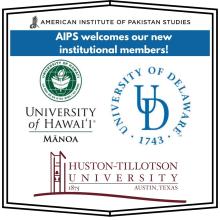Hasan Hameed, a participant in the most recent AIPS Emerging Scholars Symposium in 2022, recently published an article in Modern Intellectual History titled 'Arguing Pakistan in Late Colonial India.' The article explores the ideas of Shabbir Ahmad Usmani and argues that Usmani viewed Pakistan as a particular kind of Islamic democracy.










